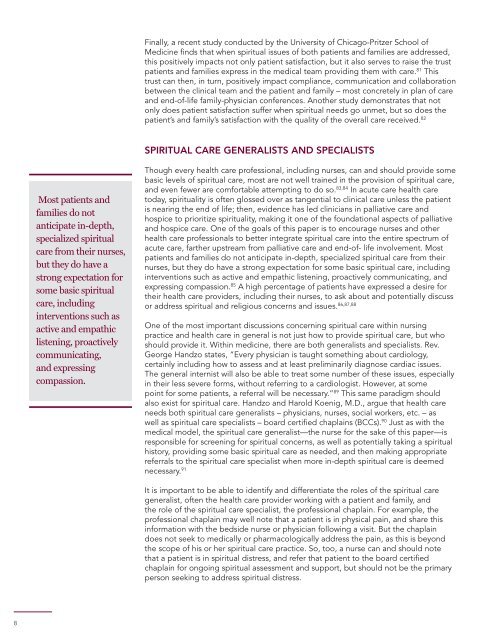S piritual Care and Nursing A Nurse’s Contribution and Practice
UsmH30a0tgV
UsmH30a0tgV
Create successful ePaper yourself
Turn your PDF publications into a flip-book with our unique Google optimized e-Paper software.
Finally, a recent study conducted by the University of Chicago-Pritzer School of<br />
Medicine finds that when s<strong>piritual</strong> issues of both patients <strong>and</strong> families are addressed,<br />
this positively impacts not only patient satisfaction, but it also serves to raise the trust<br />
patients <strong>and</strong> families express in the medical team providing them with care. 81 This<br />
trust can then, in turn, positively impact compliance, communication <strong>and</strong> collaboration<br />
between the clinical team <strong>and</strong> the patient <strong>and</strong> family – most concretely in plan of care<br />
<strong>and</strong> end-of-life family-physician conferences. Another study demonstrates that not<br />
only does patient satisfaction suffer when s<strong>piritual</strong> needs go unmet, but so does the<br />
patient’s <strong>and</strong> family’s satisfaction with the quality of the overall care received. 82<br />
SPIRITUAL CARE GENERALISTS AND SPECIALISTS<br />
Most patients <strong>and</strong><br />
families do not<br />
anticipate in-depth,<br />
specialized s<strong>piritual</strong><br />
care from their nurses,<br />
but they do have a<br />
strong expectation for<br />
some basic s<strong>piritual</strong><br />
care, including<br />
interventions such as<br />
active <strong>and</strong> empathic<br />
listening, proactively<br />
communicating,<br />
<strong>and</strong> expressing<br />
compassion.<br />
Though every health care professional, including nurses, can <strong>and</strong> should provide some<br />
basic levels of s<strong>piritual</strong> care, most are not well trained in the provision of s<strong>piritual</strong> care,<br />
<strong>and</strong> even fewer are comfortable attempting to do so. 83,84 In acute care health care<br />
today, s<strong>piritual</strong>ity is often glossed over as tangential to clinical care unless the patient<br />
is nearing the end of life; then, evidence has led clinicians in palliative care <strong>and</strong><br />
hospice to prioritize s<strong>piritual</strong>ity, making it one of the foundational aspects of palliative<br />
<strong>and</strong> hospice care. One of the goals of this paper is to encourage nurses <strong>and</strong> other<br />
health care professionals to better integrate s<strong>piritual</strong> care into the entire spectrum of<br />
acute care, farther upstream from palliative care <strong>and</strong> end-of- life involvement. Most<br />
patients <strong>and</strong> families do not anticipate in-depth, specialized s<strong>piritual</strong> care from their<br />
nurses, but they do have a strong expectation for some basic s<strong>piritual</strong> care, including<br />
interventions such as active <strong>and</strong> empathic listening, proactively communicating, <strong>and</strong><br />
expressing compassion. 85 A high percentage of patients have expressed a desire for<br />
their health care providers, including their nurses, to ask about <strong>and</strong> potentially discuss<br />
or address s<strong>piritual</strong> <strong>and</strong> religious concerns <strong>and</strong> issues. 86,87,88<br />
One of the most important discussions concerning s<strong>piritual</strong> care within nursing<br />
practice <strong>and</strong> health care in general is not just how to provide s<strong>piritual</strong> care, but who<br />
should provide it. Within medicine, there are both generalists <strong>and</strong> specialists. Rev.<br />
George H<strong>and</strong>zo states, “Every physician is taught something about cardiology,<br />
certainly including how to assess <strong>and</strong> at least preliminarily diagnose cardiac issues.<br />
The general internist will also be able to treat some number of these issues, especially<br />
in their less severe forms, without referring to a cardiologist. However, at some<br />
point for some patients, a referral will be necessary.” 89 This same paradigm should<br />
also exist for s<strong>piritual</strong> care. H<strong>and</strong>zo <strong>and</strong> Harold Koenig, M.D., argue that health care<br />
needs both s<strong>piritual</strong> care generalists – physicians, nurses, social workers, etc. – as<br />
well as s<strong>piritual</strong> care specialists – board certified chaplains (BCCs). 90 Just as with the<br />
medical model, the s<strong>piritual</strong> care generalist—the nurse for the sake of this paper—is<br />
responsible for screening for s<strong>piritual</strong> concerns, as well as potentially taking a s<strong>piritual</strong><br />
history, providing some basic s<strong>piritual</strong> care as needed, <strong>and</strong> then making appropriate<br />
referrals to the s<strong>piritual</strong> care specialist when more in-depth s<strong>piritual</strong> care is deemed<br />
necessary. 91<br />
It is important to be able to identify <strong>and</strong> differentiate the roles of the s<strong>piritual</strong> care<br />
generalist, often the health care provider working with a patient <strong>and</strong> family, <strong>and</strong><br />
the role of the s<strong>piritual</strong> care specialist, the professional chaplain. For example, the<br />
professional chaplain may well note that a patient is in physical pain, <strong>and</strong> share this<br />
information with the bedside nurse or physician following a visit. But the chaplain<br />
does not seek to medically or pharmacologically address the pain, as this is beyond<br />
the scope of his or her s<strong>piritual</strong> care practice. So, too, a nurse can <strong>and</strong> should note<br />
that a patient is in s<strong>piritual</strong> distress, <strong>and</strong> refer that patient to the board certified<br />
chaplain for ongoing s<strong>piritual</strong> assessment <strong>and</strong> support, but should not be the primary<br />
person seeking to address s<strong>piritual</strong> distress.<br />
8


